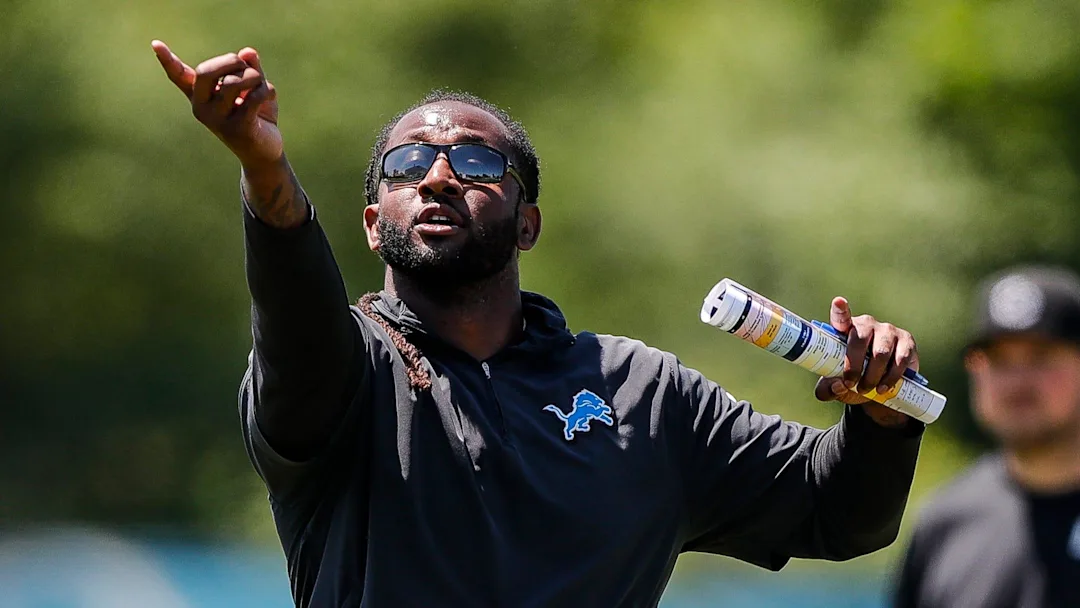Things DC Kelvin Sheppard Can Do Differently Than Aaron Glenn
The Detroit Lions have entered a new chapter in their defensive strategy, with Kelvin Sheppard stepping in as the team’s new defensive coordinator following the departure of Aaron Glenn. As the Lions seek to become more competitive in the NFL, much of their success hinges on improving their defense, which has been inconsistent in recent seasons. With Sheppard’s arrival, there’s a sense of anticipation among Lions fans, as he brings a fresh perspective and a different style of coaching to the defensive unit. While Glenn had his own set of strengths, Sheppard’s approach could potentially bring new dynamics to the Lions’ defense that will help them be more effective and efficient on the field.
Sheppard comes to the Lions with a strong background in both coaching and playing, which gives him a unique understanding of the game and the ability to relate to players on a personal level. His experience as a linebacker in the NFL provides him with valuable insight into how to build a successful defense, and his coaching tenure has been marked by an emphasis on fundamentals, aggressive play, and the development of young talent. These qualities are likely to set him apart from Aaron Glenn, who was more known for his focus on building a complex and innovative defensive scheme. While Glenn’s system was predicated on creating confusion and leveraging multiple defensive looks to disrupt opposing offenses, Sheppard’s approach may be more straightforward, with an emphasis on solid fundamentals and making sure that the players are in the right place to make plays.
One of the first areas where Sheppard can differ from Glenn is in his overall defensive philosophy. While Glenn was known for being an aggressive coach who relied heavily on blitzing and disguising his defensive schemes, Sheppard could opt for a more balanced approach. Rather than relying on constant blitz packages, Sheppard might favor a defense that is more sound and less dependent on getting immediate pressure. He could focus on creating a defense that can stop the run efficiently and still get pressure on the quarterback without needing to blitz on every down. This approach could give the Lions a more stable defense that doesn’t put their secondary in risky situations and makes it easier for the defense to play with consistency throughout the game.
Another key difference between Sheppard and Glenn is their approach to player development. Glenn’s system was designed to create complex coverage schemes and varied looks, which often required a high level of understanding from his defensive backs and linebackers. While this could work for players who had the experience to read the game at a high level, it sometimes led to mistakes from younger or less experienced players. Sheppard’s approach could be more focused on simplifying the game for his players, particularly in the secondary and linebacker corps, allowing them to play faster and with more confidence. Sheppard has shown an ability to work with younger players and help them develop at a quicker pace, something that will be crucial for a Lions defense that is still in the midst of its rebuild. If Sheppard can simplify things for his players without sacrificing effectiveness, it could go a long way in making the defense more cohesive and efficient.
Another area where Sheppard may differ from Glenn is his emphasis on the fundamentals of tackling. Glenn’s aggressive blitz-heavy approach often relied on a “bend but don’t break” mentality, which sometimes left the defense vulnerable to missed tackles or gaps in coverage. Sheppard, on the other hand, may place a greater emphasis on ensuring that his defenders are fundamental in their approach to tackling. Tackling is one of the most critical aspects of defensive play, and Sheppard has a history of stressing the importance of getting the fundamentals right. By instilling a culture of strong, efficient tackling, Sheppard could help his defenders avoid giving up big plays and prevent opponents from gaining yards after contact. A focus on tackling could significantly reduce the number of missed tackles, which has been a recurring issue for the Lions in recent seasons.
In addition to his approach to tackling, Sheppard’s focus on defensive line play may also stand out from Glenn’s. While Glenn’s defensive schemes often featured varied line movements and blitzes designed to confuse the offensive line, Sheppard may place a greater emphasis on winning the battle upfront through solid technique and power. Sheppard’s experience as a linebacker gives him a unique understanding of how crucial it is for the defensive line to control the line of scrimmage, and he could work to ensure that the Lions’ defensive line is more dominant at the point of attack. By developing strong defensive linemen who can push the pocket and control the line of scrimmage without relying on frequent blitzing, Sheppard could provide the Lions with a more stable and consistent pass rush.
Another way in which Sheppard can distinguish himself from Glenn is in how he utilizes his linebacker corps. Glenn’s defense often featured linebackers playing multiple roles, sometimes dropping into coverage or rushing the passer, depending on the situation. While this flexibility can be effective, it can also create confusion and miscommunication, especially when linebackers are asked to perform a variety of tasks. Sheppard, on the other hand, may take a more traditional approach with his linebackers, allowing them to focus on what they do best. He could emphasize the importance of playing disciplined football, focusing on their primary responsibilities such as stopping the run, covering short-to-intermediate routes, and rushing the passer when needed. By simplifying the roles of his linebackers and ensuring that they have a clear understanding of their duties, Sheppard could create a more organized defense that is easier to execute.
Sheppard could also take a more direct approach to the secondary. Under Glenn, the secondary was often tasked with complex coverage schemes, where defenders were asked to read the quarterback’s eyes and adjust their coverage accordingly. While this can be effective in certain situations, it often led to breakdowns in coverage, especially when defenders were unsure of where they needed to be. Sheppard may opt for a more straightforward approach in the secondary, with a greater focus on man-to-man coverage or zone principles that are easier for young players to understand. By simplifying the coverage schemes, Sheppard could help his secondary players make more plays on the ball and reduce the number of blown coverages.
Finally, Sheppard’s leadership style will likely differ from Glenn’s as well. While Glenn was known for his intensity and fiery personality, Sheppard brings a more composed and measured approach to the defensive coordinator role. His experience as a former player gives him a unique ability to connect with players and understand their mindset. Sheppard’s leadership style may be more focused on building trust and creating an environment where players feel empowered to make plays, rather than focusing solely on executing complex schemes. This approach could foster a greater sense of confidence and cohesion within the defense, which could be crucial for the Lions as they continue to build their identity.
In conclusion, while Aaron Glenn’s tenure as defensive coordinator for the Detroit Lions featured some notable successes, there is a strong sense that Kelvin Sheppard could bring a fresh and effective approach to the team’s defense. Sheppard’s emphasis on fundamentals, simplified schemes, tackling, and player development could be the key to unlocking the potential of the Lions’ defensive unit. While Sheppard’s approach may differ from Glenn’s in many ways, the goal remains the same: to build a defense that can consistently compete and give the team a chance to win week in and week out. Fans and analysts alike will be watching closely to see how Sheppard’s vision takes shape and whether it can bring the Detroit Lions the defensive success they’ve long been searching for.



